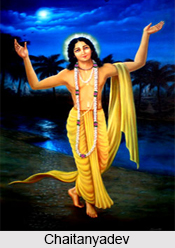 During medieval period, Vaisnava literature was dealing with a new genre, which was mainly associated with biography. In this genre, poetical works about the lives of historical personalities were composed. The first biographical book named "Chaitanya Charita" was composed in Sanskrit by Murari Gupta, who was Chaitanyadev`s contemporary. Below the biographical works of Vaishnava literature in medieval period has been discussed below in brief.
During medieval period, Vaisnava literature was dealing with a new genre, which was mainly associated with biography. In this genre, poetical works about the lives of historical personalities were composed. The first biographical book named "Chaitanya Charita" was composed in Sanskrit by Murari Gupta, who was Chaitanyadev`s contemporary. Below the biographical works of Vaishnava literature in medieval period has been discussed below in brief.
Murari Gupta"s Chaitanya Charita
Murari Gupta"s "Chaitanya Charita" was in the form of a diary with a mixture of prose and poetry. Hence, this is also known as "Murari Gupter Kadcha". It contains several important events in the life of Chaitanyadev, beginning with his birth and ending with his death. Murari Gupta depicted Chaitanyadev as the personification of Radha and Krishna, united together in love.
Brindaban Das"s Chaitanyabhagavata
"Chaitanyabhagavata" was the first poetical biography written in Bengali language. It was composed by Brindaban Das after 15 years of Chaitanyadev"s death. Brindaban Das depicted Chaitanyadev as the incarnation of Krishna.
Lochan Das`s Chaitanya Mangal
Lochan Das"s "Chaitanya Mangal" was the second biography of Chaitanyadev. This is considered to be the best of these three poetical biographies.
Krishnadasa Kaviraja"s "Chaitanyacharitamrita"
Among other poetical biographies, Krishnadasa Kaviraja"s biography of Chaitanyadev named "Chaitanyacharitamrita" (1612) was one of the most important ones. Krishnadasa was a disciple of Raghunath Das, an ascetic of Brindaban. Krishnadasa`s poem was popular because, though its main theme was the life of Chaitanyadev, it also contained reflections on the philosophy of Vaisnavism and its rites, contemporary history, society and traditions. Krishnadasa Kaviraja depicted Chaitanyadev as the personification of the spiritual relationship between Radha and Krishna.
Biographies of Advaita Acharya
Advaita Achrya was the oldest companion of Chaitanyadev. During medieval period, one biography on Sanskrit and four in Bengali were also composed about his life. The Sanskrit book "Balyalilasutra" was composed by Harakrishna Das, which deals with Advaita Achrya"s childhood life. The first book in Bengali was written by Ishan Nagar; second book (Advaitamangal) was composed by Haricharan Das; third book with the same title was written by Shyamdas, the manuscript of which is not longer found. The fourth book named Advaitabilas was done by Narahari Das in 18th century. These books provide many references about the associations of Advaita Acharya with Chaitanyadev.
Miscellaneous Writings in Medieval Period
Along with poetical biographies several plays and essays were also composed during medieval period on Vaishnava themes. Kavikaranpur wrote a Sanskrit play named "Chaitanyachandroday", which was based on the story of Chaitanyadev. Later, it was translated into Bengali with the title of "Chaitanyachandrodayakaumudi". This ten-act play emphasizes the ascetic side of Chaitanyadev`s life and his devotion to Krishna. Another play in Sanskrit named "Jagannathavallabhanatakam" was written on the life of Chaitanyadev by Ramananda Roy. The writers were also inspired by the folk legends and Puranas and implied them in their works. Among essays Nityananda`s "Premvilas", Yadunandan`s "Karnananda", Manohar Das`s "Anuragavallari" and Akinchan Das`s "Bibartavilas" are the most popular ones. These are all about devotional rites along with literary importance.













